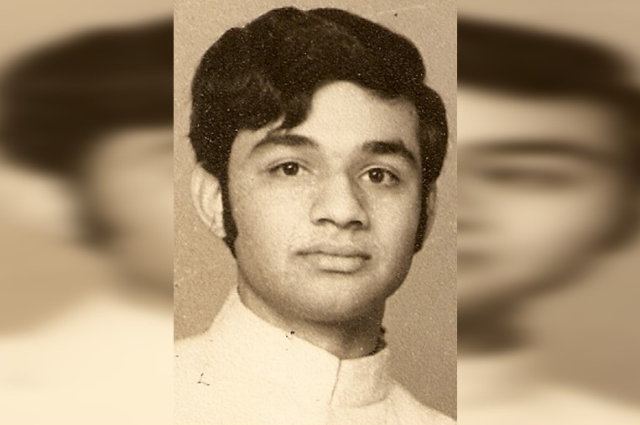“Trust the poet to make a prophecy: I will die, in autumn, in Kashmir, and the shadowed routine of each vein will almost be news, the blood censored,” - Agha Shahid Ali, “Saffron Sun”
Agha Shahid Ali, an Indian-American Poet died on 8th December 2001 due to Gliomas. He was surrounded by his friends and family at Amherst, Mass when the 51-year-old passed away.
Life was a Gazal to Ali. He dreamt of music and poetry like it would save him from all the unpleasant realities of life. Growing up in Srinagar had impacted not just his outlook toward the world but also greatly influenced his writings. ‘The Country Without a Post Office’ was where he belonged and stuck to the idea till he took his last breath. “On paper, Agha Shahid Ali was a poet of exile,” wrote Christine Benvenuto in an article in The Massachusetts Review. Ali draped in pashmina sat on his wooden secretariat in America and wrote about grief, violence, and his longing for Kashmir. Educating people about the historical vicissitudes that gave birth to violence and hatred in people who once lived together peacefully, he wrote:
“Let me cry out in that void, say it as I can. I write on that void:
Kashmir, Kaschmir, Cashmere, Qashmir, Cashmir, Cashmire, Kashmere, Cachemire, Cushmeer, Cachmiere, Cašmir. Or Cauchemar in a sea of stories?”
With a love for Rogan Josh, Shahid Ali could almost predict how tender the mutton was by the whiff of the curry. “The inescapable poignance of talking about food and half-forgotten figures from the past with a man who knew himself to be dying, was multiplied in this instance, by the knowledge that this man was also a poet who had achieved greatness – perhaps the only such that I shall ever know as a friend,” remarked writer Amitav Ghosh in his personal blog.
In a living room, filled with the voices of Begum Akhtar, Eqbal Ahmed, and James Merrill, Shahid Ali sat. Faiz Ahmed Faiz to the Spaniard Federico García Lorca, his words bridged the gap of expression between Urdu and English. While Ali produced many beautiful ghazals during his career, his writings focused mainly on the canzones, which could be called his actual masterpieces because of their exceptional formal difficulties and the fact that no other English-language author had produced anything comparable. One of his first attempts was the Gazal, ‘Tonight’ “I beg for haven: Prisons, let open your gates— A refugee from Belief seeks a cell tonight.
God’s vintage loneliness has turned to vinegar— All the archangels—their wings frozen—fell tonight.”
Apart from being a poet, he spread his wealth of knowledge and taught at Hamilton College in New York, and later moved to the University of Massachusetts-Amherst, as the director of the MFA creative writing program. Even in the early days of his youth, he taught at Jamia Millia University in New Delhi and went on to become the principal of the Teacher’s College in Srinagar. In 1961, he even enrolled at Ball State Teacher’s College, in Muncie, Indiana, to do a Ph.D. in Comparative Education. He also won awards like National Book Award in 2001, and Guggenheim Fellowship for Creative Arts in, US & Canada in his little time in America.
Ali had no partner but he was fond of Begum Akhtar in ways unimaginable. "Sorrow has no finer mask than a studied lightness of manner" was the thought that attracted the two of them toward each other. Both Ali and Akhtar had lost their mothers in the same way and he wrote
“A night of ghazals comes to an end. The singer departs through her chosen mirror, her one diamond cut on her countless necks. I, as ever, linger.”
The nakhra, wordplay, and wit of Begumbai inspired Ali in an uncanny manner. “In other circumstances, you could have said that it was a sexual kind of love – but I don’t know what it was. I loved to listen to her, I loved to be with her, and I couldn’t bear to be away from her.” he once said in an interview with Jackie Lyden. He took it upon himself to ask various English-language writers for ghazals over the course of several years. As a result, in 2000, the book Ravishing DisUnities: Real Ghazals was released.
In his last days, Ali saw his end approaching but he had made peace with it. His own death did not break him like his mother’s who had suffered brain cancer too. He had buried her in Kashmir and wanted the same for him. He did not fight against the notion that love doesn’t help anyone survive. If it was true, he would have lived forever. Every time he picked up the pen during the frozen days of December, he knew he was writing the last verses of his own life. His last wish of being buried in Kashmir was not fulfilled but in the little time that he spent in Srinagar, he lived in the only heaven earth had.
“Yes, I remember it, the day I’ll die,
I broadcast the crimson,
so long ago of that sky, its spread air, its rushing dyes,
and a piece of earth bleeding, apart from the shore,
as we went on the day I’ll die, past the guards, and he,
keeper of the world’s last saffron rowed me on an island the size of a grave.
On two yards he rowed me into the sunset, past all pain.
On everyone’s lips was news of my death but only that beloved couplet, broken, on his:
“If there is a paradise on earth
It is this, it is this, it is this.”
~ Agha Shahid Ali, 2001.

